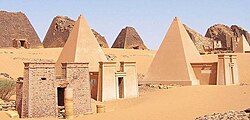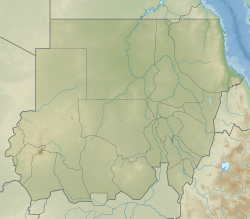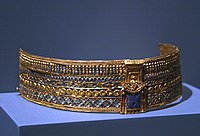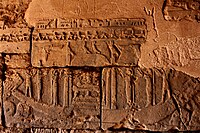You can help expand this article with text translated from the corresponding article in German. Click for important translation instructions.
|
 Pyramids of Meroë Pyramids of Meroë | |
  | |
| Location | River Nile State, Sudan |
|---|---|
| Region | Nubia |
| Coordinates | 16°56′18″N 33°44′57″E / 16.93833°N 33.74917°E / 16.93833; 33.74917 |
| Type | Settlement |
| History | |
| Cultures | Nubian (Kingdom of Kush) |
| Site notes | |
| Condition | Ruins, partly restored |
The Pyramids of Meroë are a large number of Nubian pyramids, encompassing three cemeteries near the ancient city of Meroë. The Meroë pyramids date to the later stage of the Kingdom of Kush (3rd century BCE–4th century CE) and were burial places for Kushite monarchs, other members of the royal family, and important officials and dignitaries.
The three cemeteries collectively encompass over a thousand graves, out of which at least 147 were pyramids. The majority of the pyramids (at least 82) are from the southern cemetery and were not burials of royals.
On 8 September 2020, the pyramids were threatened for the first time by floods.
Pyramids and burials
Securely identified pyramids are marked with bold text.
Southern cemetery
| This list is incomplete; you can help by adding missing items. (August 2023) |
The southern cemetery was used for royal Kushite burials for the first two or three generations in the Meroitic period (270 BCE onwards). The southern cemetery includes c. 220 burials, at least 90 of which had superstructures. Of these 90, at least 24 were pyramids. The tombs in this cemetery have been heavily pillaged.
- Beg. S 4 – Queen (non-ruling) Kanarta
- Beg. S 5 – King Amanislo
- Beg. S 6 – King Arakamani
- Beg. S 10 – Queen (non-ruling) Bartare (a.k.a. Karatari)
- Beg. S 503 – Queen (non-ruling) Khennuwa
-
The Southern Cemetery of Meroë
-
Detail of the Southern Cemetery. The large pyramids belong to Kings Arqamani and Amanislo

Northern cemetery
After briefly using the southern cemetery, the northern cemetery became the main site for royal burials. The northern cemetery contains 41 known pyramids, from 30 kings, eight queens regnant, and three other individuals (crown princes?).


 Great pyramid N6 , belonging to Queen Amanishakheto, before and after its destruction by the treasure-hunter Giuseppe Ferlini in the 1830s
Great pyramid N6 , belonging to Queen Amanishakheto, before and after its destruction by the treasure-hunter Giuseppe Ferlini in the 1830s


- Beg. N 1 – Queen Amanitore
- Beg. N 2 – Unidentified king, perhaps King Amanikhabale
- Beg. N 3
- Beg. N 4 – King Amantekha
- Beg. N 5 – Unidentified, perhaps Prince Arikhankharer
- Beg. N 6 – Queen Amanishakheto
- Beg. N 7 – King Arqamani
- Beg. N 8 – King (...)mr(...)t, perhaps identical with Adikhalamani
- Beg. N 9 – King Tabirqo, perhaps identical with Adikhalamani
- Beg. N 10 – Unidentified king, unused tomb
- Beg. N 11 – Unidentified queen regnant, perhaps Queen Nahirqo. The largest pyramid in the northern cemetery.
- Beg. N 12 – Unidentified king, perhaps King Tanyidamani
- Beg. N 13 – Unidentified king, likely King Naqyrinsan
- Beg. N 14 – Unidentified and destroyed, perhaps an unidentified king.
- Beg. N 15 – Unidentified and destroyed, perhaps an unidentified ruler.
- Beg. N 16 – Unidentified king; this pyramid was rebuilt at a later time. Perhaps King Amanikhareqerem (original) and King Aryesbokhe (rebuilt).
- Beg. N 17 – King Amanitenmemide
- Beg. N 18 – Queen Amanikhatashan
- Beg. N 19 – King Tarekeniwal
- Beg. N 20 – Unidentified king with the Horus name k3-nht, perhaps King Teriteqas
- Beg. N 21 – Unidentified ruler, perhaps Queen Shanakdakhete
- Beg. N 22 – King Natakamani
- Beg. N 24 – Unidentified, perhaps an unidentified king.
- Beg. N 25 – Unidentified queen regnant, perhaps Queen Amanipilade
- Beg. N 26 – Unidentified queen regnant, perhaps Queen Patrapeamani
- Beg. N 27 – Unidentified king, perhaps King Tamelerdeamani
- Beg. N 28 – King Teqorideamani
- Beg. N 29 – King Takideamani
- Beg. N 30 – Unidentified, perhaps an unidentified king.
- Beg. N 32 – Unidentified queen regnant, perhaps Queen Amanikhalika
- Beg. N 34 – Unidentified king, perhaps King Aritenyesbokhe
- Beg. N 35 – Unidentified, perhaps an unidentified king
- Beg. N 36 – Unidentified king, perhaps King Amanitaraqide
- Beg. N 37 – Unidentified king, perhaps King (.)p(...)niñ
- Beg. N 38 – Unidentified king, perhaps King (...)k(...)
- Beg. N 40 – Unidentified, perhaps an unidentified king.
- Beg. N 41 – Unidentified, perhaps an unidentified king.
- Beg. N 43 – Unidentified king, perhaps King Amanikhedolo
- Beg. N 51 – Unidentified king, perhaps King Yesebokheamani
- Beg. N 53 – Unidentified king, perhaps King Arnekhamani
- Beg. N 56 – Unidentified, perhaps Prince Arikakahtani
Treasures and artifacts of the North Cemetery
Numerous treasures were discovered in the pyramids since the 19th century.
-
 Lamp with handle in the shape of a horse, from the pyramid of Queen Amanikhatashan in Meroë (c.62-c.85 CE). Museum of Fine Arts, Boston
Lamp with handle in the shape of a horse, from the pyramid of Queen Amanikhatashan in Meroë (c.62-c.85 CE). Museum of Fine Arts, Boston
-
 Usekh collar of queen Amanishakheto
Usekh collar of queen Amanishakheto
-
 Bracelet from the tomb of Amanishakheto
Bracelet from the tomb of Amanishakheto
-
 Some of the treasures found by Ferlini in the pyramid of queen Amanishakheto
Some of the treasures found by Ferlini in the pyramid of queen Amanishakheto
-
 Wall of the Pyramid chapel of Amanitenmemide
Wall of the Pyramid chapel of Amanitenmemide
-
 Detail of Pyramid Chapel Beg. N1
Detail of Pyramid Chapel Beg. N1
Western cemetery
| This list is incomplete; you can help by adding missing items. (August 2023) |

The western cemetery saw the longest continuous use, with burials dating back to the 9th century BCE. The western cemetery contains no burials of monarchs and was instead used by non-royal elites. There are over 800 graves in the western cemetery, out of which at least 82 were pyramids.
- Beg. W 19 – Prince Tedeqen
See also
References
Citations
- ^ Yellin 2020, p. 579.
- Yellin 2020, p. 574.
- Yellin 2020, p. 575.
- Yellin 2020, p. 578.
- Eide et al. 1996, p. 568.
- Eide et al. 1996, p. 566.
- Török 2015, p. 460.
- Wolf & Riedel 2019, p. 14.
- Wolf & Riedel 2019, p. 3.
- ^ Yellin 2020, p. 580.
- Eide et al. 1998, p. 903.
- Eide et al. 1998, p. 839.
- Eide et al. 1998, p. 836.
- Eide et al. 1996, p. 571.
- Yellin 2020, p. 583.
- Eide et al. 1996, p. 723.
- Eide et al. 1996, p. 589.
- ^ Kuckertz 2021, pp. 5, 11.
- Török 2015, p. 204.
- Kuckertz 2021, pp. 5, 12.
- ^ Kuckertz 2021, p. 12.
- Eide et al. 1996, p. 664.
- Eide et al. 1996, p. 685.
- ^ Chapman 1952, p. 3.
- Eide et al. 1998, p. 912.
- ^ Kuckertz 2021, p. 5.
- ^ Kuckertz 2021, p. 6.
- Eide et al. 1998, p. 914.
- Eide et al. 1998, p. 935.
- Kuckertz 2021, p. 14.
- ^ Kuckertz 2021, p. 16.
- Eide et al. 1998, p. 899.
- ^ Eide et al. 1998, p. 1072.
- Eide et al. 1998, p. 1074.
- ^ Török 2015, p. 206.
- ^ Eide et al. 1998, p. 954.
- Yellin 2020, p. 582.
- Yellin 2020, p. 616.
- Edwards 2004, p. 144.
- Eide et al. 1996, p. 582.
- Dunham 1957, p. 7.
- ^ Yellin 2020, p. 570.
- Yellin 2020, p. 572.
Bibliography
- Chapman, Suzanne E. (1952). The Royal Cemeteries of Kush: Volume III: Decorated Chapels of the Meroitic Pyramids at Meroë and Barkal. The Museum of Fine Arts, Boston, Massachusetts.
- Dunham, Dows (1957). The Royal Cemeteries of Kush: Volume IV: Royal Tombs at Meroë and Barkal. The Museum of Fine Arts, Boston, Massachusetts.
- Edwards, David N. (2004). The Nubian Past: An Archaeology of the Sudan. Routledge. ISBN 978-1-134-20087-0.
- Eide, Tormod; Hägg, Tomas; Holton Pierce, Richard; Török, László (1996). Fontes Historiae Nubiorum: Textual Sources for the History of the Middle Nile Region Between the Eighth Century BC and the Sixth Century AD: Vol. II: From the Mid-Fifth to the First Century BC. University of Bergen. ISBN 82-91626-01-4.
- Eide, Tormod; Hägg, Tomas; Holton Pierce, Richard; Török, László (1998). Fontes Historiae Nubiorum: Textual Sources for the History of the Middle Nile Region Between the Eighth Century BC and the Sixth Century AD: Vol. III: From the First to the Sixth Century AD. University of Bergen. ISBN 82-91626-07-3.
- Kuckertz, Josefine (2021). "Meroe and Egypt". UCLA Encyclopedia of Egyptology.
- Török, László (2015). The Kingdom of Kush: Handbook of the Napatan-Meroitic Civilization. BRILL. ISBN 978-90-04-29401-1.
- Wolf, Pawel; Riedel, Alexandra (2019). "Meroe, Sudan. Fieldwork at the Royal Cemeteries of Meroe – A Progress report of the Qatari Mission for the Pyramids of Sudan. The years 2017 and 2018". E-Forschungsberichte (in German): 189–196. doi:10.34780/ja1u-r1dj. ISSN 2198-7734.
- Yellin, Janice W. (2020). "Prolegomena to the Study of Meroitic Art". The Oxford Handbook of Ancient Nubia. Oxford University Press. ISBN 978-0-19-049627-2.
- Yellin, Janice W. (2020b). "The Royal and Elite Cemeteries at Meroe". The Oxford Handbook of Ancient Nubia. Oxford University Press. ISBN 978-0-19-752183-0.